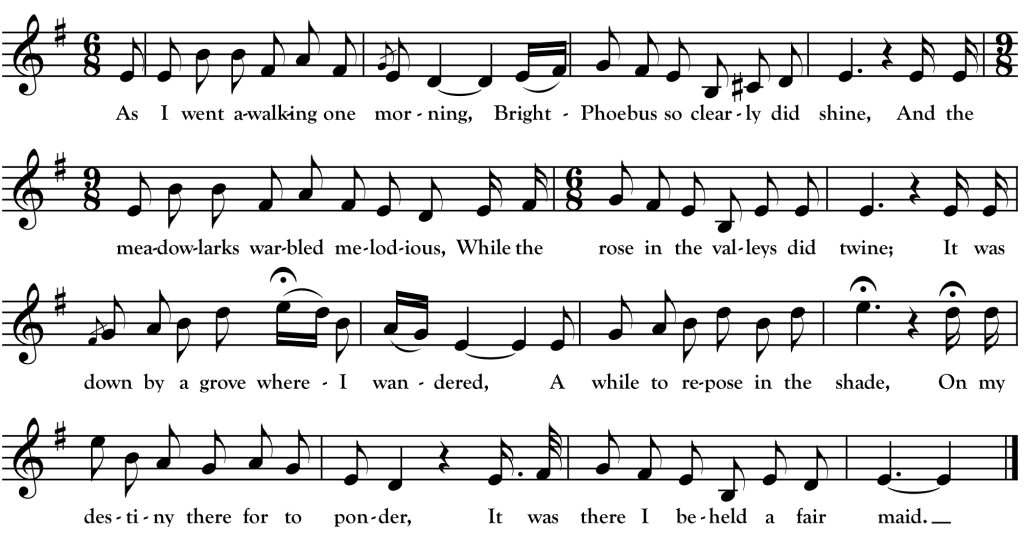The Lass of Dunmore
As I went a-walking one morning,
Bright Phoebus so clearly did shine,
And the meadow larks warbled melodious,
While the rose in the valleys did twine;
It was down by a grove where I wandered,
A while to repose in the shade,
On my destiny there for to ponder,
It was there I beheld a fair maid.
I raised up on my feet for to view her,
And those tender words I did say,
“Who are you, my fairest of creatures?
How far through this grove do you stray?”
She answered, “Kind sir, I will tell you,
And the truth unto you I deplore,
It’s a matter that’s lately befell me,
My dwelling place is down in Dunmore.
“Oh, once I did love a bold seaman,
And he, too my fond heart had gained,
No mortal on earth could love dearer,
But now he is crossing the main,
With Nelson, that hero of battle,
In the English navy so brave,
Where cannons and guns loud do rattle,
For to fight the proud French on the wave.”
“Then perhaps that your true love is drowned,
And he ne’er will return home again,
For many a man has fallen a victim
With Nelson while crossing the main;
And the same thing might happen to your love,
As it’s happened to others before,
So it’s come with me now, I pray, darling.
And leave the dark shades of Dunmore.”
“Oh, how could I be so unfaithful
To a heart that is constant and true,
To leave my own father’s dwelling
And to venture my fortunes with you?
Oh, the people would call me unconstant,
For it’s truly to him I am swore,
And true lovers ne’er should be parted,
I’ll wait for that lad in Dunmore.”
Then says I, “My fair, tender blossom,
The spring time of life soon will be o’er,
And the October leaves will be falling,
They will fade the fair Rose of Dunmore.”
When I found that her heart was a-yielding,
Like I’ve found it with others before,
Oh, I packed up my all for Renfralen,
And I stole the fair Rose of Dunmore.
_______________________________________________________________
Folksong collector and scholar Franz Rickaby hunted for songs in North Dakota, Minnesota, Wisconsin and Michigan from 1919 to 1923. Most of his informants were retired lumberjacks, or “shanty-boys,” and Rickaby took interest in how and where they learned their songs. He was also quite interested in the origins of the songs themselves. Most that were written about life in the northwoods were based on older traditional songs and Rickaby concluded, more specifically, that “the Irish street-song was the pattern upon which a liberal portion of the shanty-songs were made.”[1]
In the notes to his Ballads and Songs of the Shanty-Boy, Rickaby points out several “parent” songs that served as models for songs made up by lumbermen. One such parent song is “The Lass of Dunmore.” Rickaby cites it as the model for “The Banks of the Little Eau Pleine” which was authored by Wausau, Wisconsin timber cruiser W.N. “Billy” Allen about the drowning of a raftsman in the Wisconsin Dells. Rickaby made the connection based on a version of the text of “The Lass of Dunmore” printed by Minnesota singer Mike Dean in his songster The Flying Cloud. No melody was ever collected from Dean for “The Lass of Dunmore” but the text does resemble that of the “Little Eau Pleine” and it turns out that the only other version of “The Lass of Dunmore” I know of was collected in Allen’s home province of New Brunswick in the 1960s. Amazingly, it shares its melody with versions of “Little Eau Pleine” collected by Rickaby from both Dean and Ed Springstad of Bemidji.
Here I have married Dean’s text for “The Lass of Dunmore” with his melody used for “The Banks of the Little Auplaine” as recorded by Robert Winslow Gordon in 1924 from Dean’s singing.

